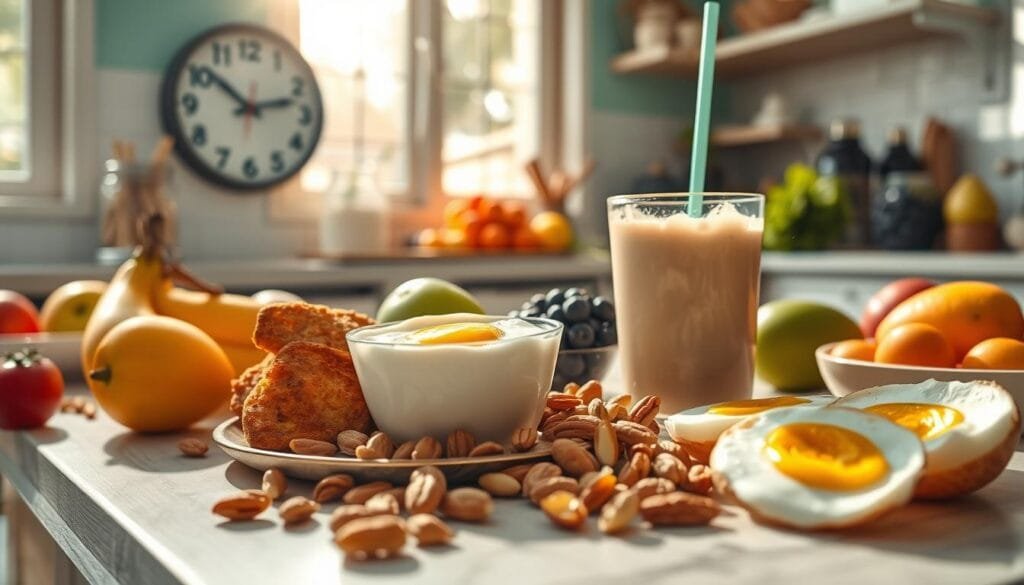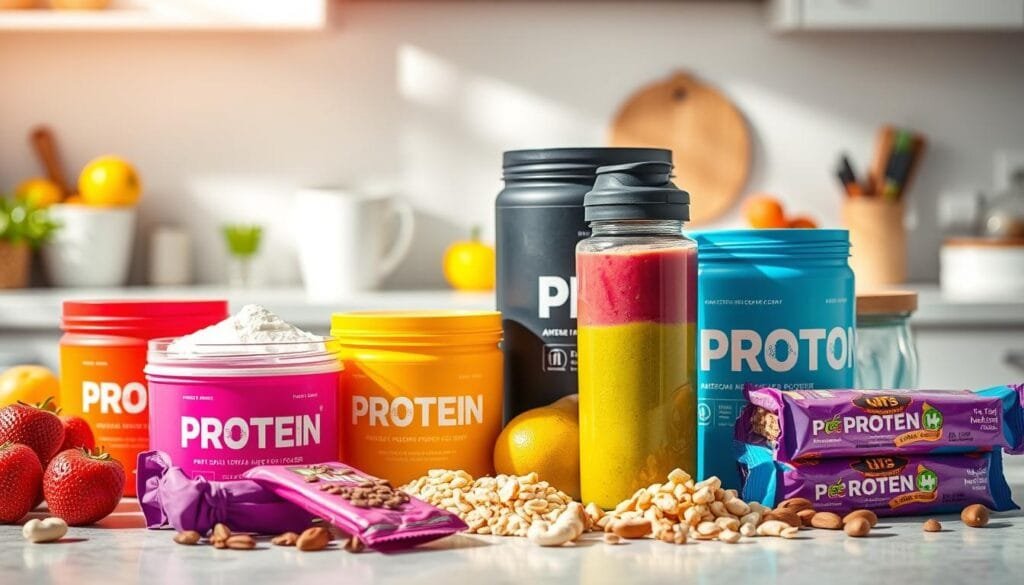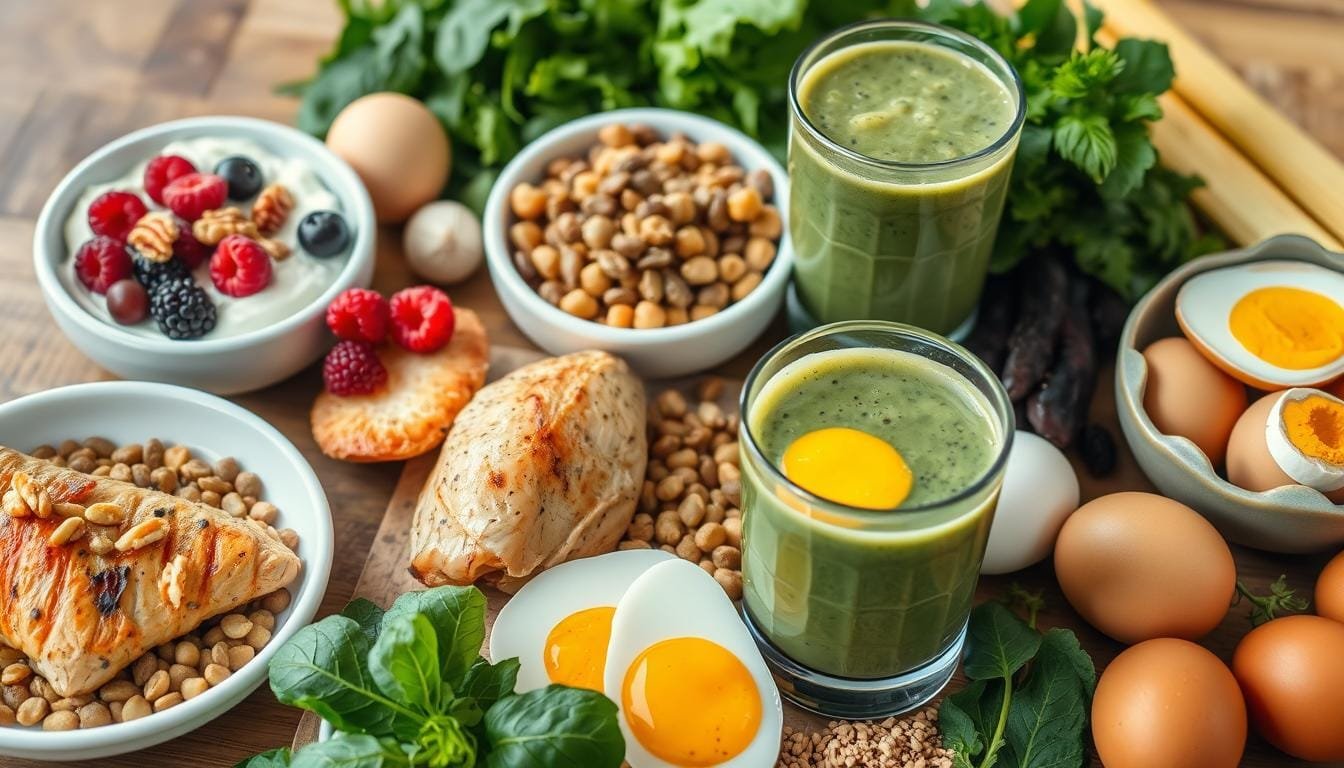Keeping a healthy diet is key for feeling good. Protein is a big part of this. It helps build and fix muscles, keeps your immune system strong, and gives you energy. In this guide, we’ll show you simple ways to get more protein every day. This will help you stay healthy and fit.
Key Takeaways
- Understand the importance of daily protein requirements for your age and activity level
- Discover high-protein breakfast ideas to start your day strong
- Explore smart protein-rich snacking options and homemade recipes
- Learn about plant-based protein sources for vegetarians and vegans
- Optimize your protein timing for maximum benefits
Understanding the Importance of Daily Protein Requirements
Protein is key for our health and well-being. It helps grow, repair, and maintain our body’s tissues. Knowing how much protein you need based on age and activity level is important. It helps with gestion du poids, modes de vie actifs, and fitness et musculation.
Recommended Daily Protein Intake by Age and Activity Level
The amount of protein you should eat changes with age, gender, and how active you are. Adults usually need 0.8 to 1.2 grams of protein per kilogram of body weight. But, if you’re very active, you might need up to 2 grams per kilogram to help your muscles grow and recover.
Why Protein is Essential for Your Body
Protein is vital for many body functions. It helps with:
- Muscle growth and repair
- Bone health and strength
- Immune system function
- Hormone production
- Energy production
Eating enough high-quality protein can also help with gestion du poids. It makes you feel full and supports lean muscle mass.
Signs of Protein Deficiency
Protein deficiency can cause muscle wasting, a weak immune system, slow healing, and fatigue. It’s crucial to watch your protein intake, especially if you’re into fitness et musculation or have a busy lifestyle. This ensures your body gets the nutrients it needs to work well.
| Age | Recommended Daily Protein Intake |
|---|---|
| Children (4-8 years) | 19 grams |
| Adolescents (14-18 years) | 52 grams (girls) / 85 grams (boys) |
| Adults (19-59 years) | 46 grams (women) / 56 grams (men) |
| Older Adults (60+ years) | 57 grams (women) / 71 grams (men) |
« Protein is not just for bodybuilders; it’s essential for everyone’s overall health and well-being. »
High-Protein Breakfast Ideas for a Strong Start
Starting your day with a protein-rich breakfast boosts your energy and keeps you full. Adding recettes riches en protéines and repas équilibrés et sains to your morning helps you reach your protein goals. It also supports your overall health. Here are some tasty and healthy high-protein breakfast ideas to try.
Protein-Packed Breakfast Smoothie
Make a smoothie by blending your favorite fruits, veggies, and protein powder or Greek yogurt. It’s creamy and packed with nutrients. This smoothie is a great way to start your day, with protein, fiber, and antioxidants.
Savory Egg-Based Dishes
- Scrambled eggs with sautéed spinach and feta
- Veggie-loaded omelets with lean protein like turkey or chicken
- Breakfast burrito with eggs, black beans, and avocado
Overnight Oats with Nut Butter
Make overnight oats the night before. Top it with nut butter, fresh berries, and chia seeds. This breakfast is full of protein, fiber, and healthy fats to start your day right.
« Starting your day with a protein-packed meal can help you feel fuller for longer, which may support weight management and overall health. »
By adding these recettes riches en protéines and repas équilibrés et sains to your morning, you get a nutritious and filling breakfast. It’s a great way to kick off a productive and energetic day.
Smart Protein-Rich Snacking Options
Keeping a healthy diet is key, and that means getting enough good proteins all day. Luckily, there are many tasty and healthy protein snacks out there. You can find them in stores or make them at home.
Quick Grab-and-Go Protein Snacks
When you’re in a hurry, these protein snacks are perfect:
- Greek yogurt with fresh berries
- Hard-boiled eggs
- Single-serving packets of nut butter with apple slices
- Cottage cheese topped with nuts and a drizzle of honey
- Protein bars made with sources de protéines végétales
Homemade Protein-Packed Snack Recipes
With a bit more time, you can make these tasty, healthy snacks:
- Protein-rich energy bites made with oats, nut butter, and sources de protéines végétales
- Roasted chickpeas seasoned with spices for a crunchy alimentation saine et équilibrée snack
- Homemade trail mix with a variety of nuts, seeds, and dried fruit
- Veggie sticks with a creamy hummus dip
Adding these quick and easy protein snacks to your day helps meet your protein needs. It keeps your diet balanced and healthy all day long.
6 astuces simple pour manger plus de proteines en une journée
Adding more protein to your diet can boost your health. It helps build muscles and keeps you full. Here are six easy ways to get more protein in your day.
- Start Your Day with a Protein-Rich Breakfast: Begin with a meal that has lots of protein. Try eggs, Greek yogurt, or a protein smoothie.
- Snack on Nuts and Seeds: Always have nuts and seeds ready. They’re full of protein and easy to snack on.
- Add Protein-Rich Toppings to Your Meals: Add shredded chicken, tofu, or feta cheese to your dishes. It makes them more protein-rich.
- Incorporate Legumes into Your Diet: Beans and lentils are great for plant-based protein. They’re easy to add to many meals.
- Choose Lean Protein Sources: Pick lean meats, poultry, or seafood. They have more protein and less fat.
- Use Protein Powder in Shakes and Baked Goods: Add protein powder to smoothies or baked goods. It’s a quick protein boost.
These simple tips can help you effortlessly increase your daily protein intake. They support your health and wellness.
| Protein Source | Protein Content (per serving) |
|---|---|
| Eggs (1 large) | 6g |
| Greek Yogurt (1 cup) | 23g |
| Almonds (1 oz) | 6g |
| Lentils (1 cup cooked) | 18g |
| Grilled Chicken Breast (4 oz) | 35g |
« Increasing your daily protein intake can have a significant impact on your overall health and well-being. »
Plant-Based Protein Sources for Vegetarians and Vegans
Vegetarians and vegans need to find enough plant-based proteins for a healthy diet. Animal proteins are often seen as complete because they have all essential amino acids. But, plants offer many sources de protéines végétales for a balanced alimentation saine et équilibrée.
Complete vs. Incomplete Protein Sources
Proteins are either complete or incomplete. Complete proteins, like those in meat, eggs, and dairy, have all essential amino acids. Incomplete proteins, found in plants, lack some amino acids.
Combining Plant Proteins for Maximum Benefits
- To get all essential amino acids, mix different sources de protéines végétales. For example, quinoa or rice with lentils or chickpeas makes a complete protein.
- Other good mixes include nuts or seeds with their butters, or blending various plant proteins in smoothies or meals.
Knowing the difference between complete and incomplete proteins helps. By combining plant-based sources, vegetarians and vegans can meet their protein needs.
Protein Timing: When to Eat Protein for Optimal Results
Protein timing is key for getting the most out of your fitness et musculation and nutrition sportive plans. It affects muscle growth, recovery, and performance.
The best time to eat protein is right after working out. Your muscles are ready to soak up nutrients then. Eating a high-quality protein within 30 minutes to an hour after your workout helps start muscle building and aids in recovery.
If you want to build and keep lean muscle, eat protein all day. Try to have a protein-rich food or supplement at each meal and snack. This keeps your muscles fueled with amino acids.
| Optimal Protein Timing | Goal |
|---|---|
| Immediately after a workout | Muscle recovery and growth |
| Every 3-4 hours throughout the day | Sustained muscle building and maintenance |
| Before bedtime | Overnight muscle repair and recovery |
Knowing when to eat protein can boost your fitness et musculation and nutrition sportive success. It helps you reach your fitness goals faster.

« Proper protein timing can mean the difference between reaching your fitness goals and falling short. »
Common Mistakes When Increasing Protein Intake
Adding more protein to your diet can help with gestion du poids and alimentation saine et équilibrée. But, there are pitfalls to watch out for. Let’s look at common mistakes and how to avoid them to get the most from protein.
How to Avoid Protein Overconsumption
One big mistake is eating too much protein. This can harm your kidneys, cause dehydration, and even make you gain weight. It’s key to know how much protein you need based on your age, how active you are, and your health.
- Consult with a healthcare professional to determine your optimal daily protein intake.
- Incorporate a variety of protein sources, including lean meats, poultry, fish, eggs, and plant-based options, to meet your needs.
- Avoid relying solely on protein supplements, as they can easily lead to overconsumption if not balanced with whole food sources.
Quality vs. Quantity in Protein Sources
The quality of your protein is as important as the amount. Choosing high-quality, nutrient-dense sources gives you essential vitamins and minerals. These support your health and well-being.
But, low-quality or processed proteins, like heavily processed meats or protein powders with artificial additives, can harm your gestion du poids and alimentation saine et équilibrée goals.
« When it comes to increasing protein intake, focus on the quality of the sources, not just the quantity. »
Protein Supplements: When and How to Use Them Effectively
In the quest for optimal fitness et musculation and nutrition sportive, protein supplements are popular. But, using them right is key. This section will guide you on when and how to use them best.
Whole foods should be your main protein source. But, supplements can help if you can’t get enough from food. This is especially true for vegetarians, vegans, or those who work out a lot.
Choosing the Right Protein Supplement
Choosing the right protein supplement is important. Look at the type of protein, its quality, and any extra ingredients. You’ll find whey, casein, plant-based options, and blends. Each has its own benefits, depending on your goals and diet.
Timing and Dosage
- When you take your protein supplement matters. For example, a whey protein shake after working out helps with muscle recovery.
- The right amount of protein supplements varies. It depends on your age, how active you are, and your diet. Most adults need 1.6 to 2.2 grams of protein per kilogram of body weight daily.
Talking to a healthcare professional or nutritionist is key. They can help figure out the best supplement plan for you.
« Protein supplements can be a useful tool, but they should not replace a well-balanced diet rich in whole, nutrient-dense foods. »
In conclusion, protein supplements can be great for fitness et musculation and nutrition sportive. But, use them wisely and with a balanced diet. Knowing the right timing and dosage helps you get the most out of them.

Conclusion
In this guide, we’ve looked at how important protein is in our lives. We’ve found ways to augmenter l’apport protéique quotidien. You now know how to add more protein to your alimentation saine et équilibrée.
It’s important to balance your protein intake. Don’t overdo it or just use supplements. Instead, eat a variety of protein-rich foods, from animals and plants, to fit your health and fitness goals.
Using the tips from this article, you can increase your protein intake. This will boost your energy and help your body perform better. Start this journey towards a healthier lifestyle today. Small changes can make a big difference in your alimentation saine et équilibrée.
FAQ
What are the recommended daily protein requirements?
The amount of protein you need daily depends on your age, how active you are, and other factors. Adults usually need 0.8-1.2 grams of protein for every kilogram of body weight. If you’re more active or trying to build muscle, you might need 1.6-2.2 grams per kilogram.
Why is protein essential for the body?
Protein is key for growing, repairing, and keeping tissues and cells healthy. It helps build and fix muscles, makes hormones and enzymes, and boosts your immune system.
What are the signs of protein deficiency?
Signs of not getting enough protein include losing muscle, a weak immune system, slow healing, constant tiredness, and changes in hair, skin, and nails. A bad case can cause swelling, fatty liver, and mental problems.
What are some high-protein breakfast ideas?
Good protein-rich breakfasts include Greek yogurt with fruit and nuts, eggs with whole-grain toast, protein smoothies, and oatmeal with nut butter and berries.
What are some quick and easy protein-rich snack options?
Quick protein snacks are hard-boiled eggs, cottage cheese with fruit, hummus with veggies, nut butter packets, protein bars, and Greek yogurt with granola.
How can vegetarians and vegans meet their protein needs?
Vegetarians and vegans can get protein from legumes, lentils, tofu, tempeh, quinoa, nuts, and seeds. Mixing different plant proteins, like rice and beans, gives all the amino acids needed.
When is the best time to consume protein for optimal results?
Eating protein around workouts helps with muscle recovery and growth. Having a protein-rich snack or meal before and after exercise is best. Also, spread out your protein intake throughout the day for overall health.
What are some common mistakes to avoid when increasing protein intake?
Avoid eating too much protein, relying only on supplements, and ignoring protein quality. Find a balanced way to meet your needs without overdoing it or losing nutritional value.
When and how should protein supplements be used?
Supplements can help increase protein intake, especially for athletes or those needing more. But, use them with a balanced diet and not as a whole food substitute. Adjust the timing and amount based on your goals and needs.









